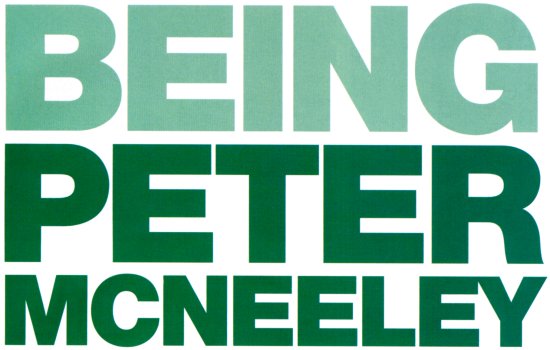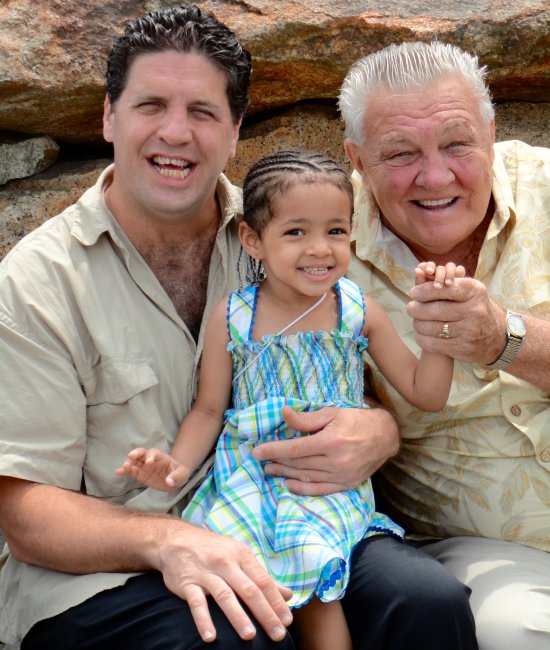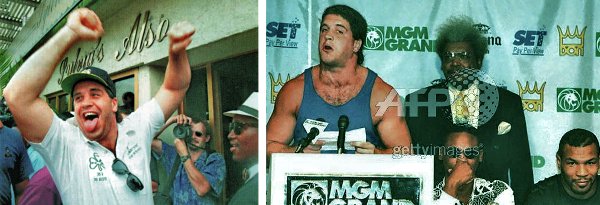 |
AUGUST 2010 Issue
|
 |
 |
|
|
By RICHARD FLETCHER
The meteoric rise to the spotlight ended at the hands of Mike Tyson, but the fall from grace was far slower and a lot more painful.
|
|
The afternoon temperature in Norwood is soaring and Peter McNeeley is by the pool. He's thinking back and everything is clear. Nearly 15 years after he was catapulted from virtual obscurity into a fight with Mike Tyson — then almost self-destructed — McNeeley has found some peace. The chaos and hoopla have gone, and McNeeley is now a man trying to get to know himself.
When prompted, he recounts every part of the Tyson experience in minute detail. But the toughest fight of his life is still going on. Now 41, McNeeley is in recovery after a debilitating drug habit that started when he was 10 and, he confesses, shortened his career. By the time he officially retired in 2006, he had gone five years without a fight.
|
 |
| McNEELEY SHOCKED everyone by launching an all-out assault on Tyson from the opening bell (above), but Tyson, in his first fight after being released from prison, regained his composure and fired back to bring a finish that many felt was too early (below). From that point, McNeeley's career and personal life plummeted, but he has recovered from drug addiction and today helps counsel youngsters against the dangers of drugs. |
 |
|
|
McNeeley now has new priorities. He attends support groups to warn youngsters about the dangers of drink and drugs, and is the doting father of a two-year-old daughter, Nadiya, with whom he remains in close contact despite the break-up of his five-year relationship with her mother.
But McNeeley cannot completely escape his past. On 19 August 1995, after three months of relentless hype, he met Tyson head-on in front of a paying crowd of 16,113 at the MGM Grand Garden in Las Vegas. The fight lasted 89 seconds, but McNeeley came out with credit and a career-best purse of $540,000.
Although a mismatch, the fight turned into an historic event. Unprecedented interest centered on Tyson, who had been released from prison only months earlier after serving half of a six-year sentence for rape.
The bout grossed nearly $14 million at the gate and a record $67.1 million in pay-per-view sales. It remains the richest non-title fight of all time. Including the 1,550,000 buys on the Showtime network in America, it was watched worldwide by an estimated TV viewing audience of two billion. Tyson earned $25 million.
Despite being originally lined up to challenge Lennox Lewis's conqueror, Oliver McCall, for the WBC title, McNeeley admits he knew the Tyson fight had been coming.
"I was already with Don King," McNeeley recalled. "The rumblings, the rumors, were running rampant for months before I actually signed the contract.
"Ninety-five per cent of the people in boxing were saying 'he [Tyson] is fighting McNeeley'. Regular people didn't know, but the boxing people were talking about it like it was already a done deal. I knew, because I was with Don King, that it was very likely.
"It was like a winning lottery ticket. In a way, I felt like I was catching him at his best and, in a way, I felt like I was catching him at his worst. I figured he'd be stale and he wasn't gonna be as sharp as he was because of four years out.
"I really did believe that I could win. If you can't go into a fight thinking you can win, then you might as well not even sign for it, let alone get into the ring. I was coming to win. I wasn't coming to lose."
Only McNeeley believed it. Despite 36 wins in 37 fights, his record didn't stand up well to close scrutiny. He had spent four years fighting almost exclusively in Massachusetts, his home state, beating up men, many of whom were barely fit to fight. Only four of his opponents had winning records. Of McNeeley's 30 knockouts, 21 had come in the first round.
|
 |
| Peter McNeeley (left) is pictured today with daughter Nadiya, 2, and ex-fighter father, Tom. |
|
|
But there was no turning back. Once the Tyson fight was signed, everyone suddenly wanted to know who McNeeley was. "It was crazy," he said. "I lived in a small neighborhood in a small town called Medfield, about 45 minutes outside Boston. The streets were lined with cars and trucks every day. Every morning, I'd wake up, there'd be a pack of people in my driveway waiting for me to come out and do my running. They wanted to talk to me after I ran.
"I'd lived my whole life in Medfield and the town was not ready for that type of spotlight. We weren't ready for that, either. But whether I was ready or not wasn't the point. It was like a snowball being rolled into a huge, huge boulder. Once it's started, no-one's gonna stop it. But I will say this. Because of my dad's career, and my family history, my whole career was like that. Whether it was a worldwide spotlight, or a national spotlight, or a state spotlight, from the day I had my first amateur fight, there was a lot of attention because of my dad."
His dad was Tom McNeeley, now 73, who had been a top contender and was floored 11 times in four rounds by Floyd Patterson when challenging for the world heavyweight championship in Ontario, Canada, in December 1961. Before that, McNeeley's grandfather had been part of the U.S. boxing team which competed at the 1928 Olympics in Amsterdam.
McNeeley went everywhere. After another head-to-head press conference in New York, he was summoned to Los Angeles, then back to Las Vegas, as media attention intensified. A natural showman, McNeeley thrived on it. With a twinkle in his eye, he kept up the bravado, memorably telling reporters in LA that he would wrap Tyson in a "cocoon of horror".
McNeeley said: "We were on the final press tour. It was reaching feverish heights. I'd never been to California in my life. We set up a training camp in Las Vegas in late July. We were there for a month before the fight. We were told that, ten days before the fight, we were going to LA on a final push for press. I was on [The Tonight Show With] Jay Leno, The George Michael Sports Machine and Up Close with Chris Myers on ESPN. They put me in a limousine and they carted me around Los Angeles and Hollywood like a piece of meat."
Although McNeeley's credentials were called into serious question, he insists he was qualified to fight Tyson at that time. "When we chose the fight, I was ranked seventh in the world by the WBA and 10th in the world by the WBC," McNeeley reminded. "Don King's smart. If I'd beaten Tyson, I was already under contract to him. So he was gonna win either way. You've got to remember, it was a 10-round non-title bout. It wasn't for the championship. Did I deserve to be there? I don't know. Did I feel like I had a shot? Hell, yes."
At the weigh-in, McNeeley looked fit and trim, scaling 224 pounds. Tyson came in four pounds lighter, but was leaner and ripped, with a huge, sculpted chest, the result of weight-training while in prison.
On the night, McNeeley held his nerve in the face of an awful reality. As referee Mills Lane issued his pre-fight instructions, McNeeley swayed from side to side, grinning almost fiendishly through his mouthpiece. Tyson stood stock still, his eyes following McNeeley's for any sign of fear.
McNeeley showed none. At the first bell, he rushed full speed at Tyson, only to take an arcing right hand that put him down within seven seconds. McNeeley jumped straight up and ran around the ring as if on a training run. Once he had stopped, Lane gave him a standing count and sent him back in. McNeeley bravely continued to brawl, but it was only a matter of time before Tyson found a pay-off punch.
After two breaks in the action, it arrived. A vintage right uppercut sent McNeeley down face-first into the ropes. He was badly hurt, but got up, glassy-eyed, and stared straight back at Tyson. It was his final act of defiance. Vecchione had seen enough and jumped into the ring to spare McNeeley, causing his fighter's disqualification.
The ending visibly angered Showtime analyst Ferdie Pacheco, who protested that McNeeley should have been allowed to at least see out the round. Chants of "bullshit" at the stoppage could be heard in sections of the arena.
|
 |
| "My trainer, Vinnie Vecchione, was like a father to me. Vinnie was a best friend. He was everything. I still miss him greatly." — PETER McNEELEY |
|
|
McNeeley remembered: "I wanted to do to him [Tyson] what he did to all his other opponents. Nobody else had done that to him, [tried] to take him out of his game. Maybe it would make him hesitate or rethink things because he hadn't been in the ring in four years. I wanted to really push him.
"The first knockdown, I'm not telling you I didn't get hit, but I was off balance. That punch wouldn't have knocked me down if my feet had been in the right place. The ref didn't even start a count, I was up so quick.
"But the second knockdown was his best punch, the right uppercut, point blank, on the chin. I went down on my face. I was so messed up, I couldn't even get my hands up to stop my face from hitting the canvas. When I got up, and Mills Lane separated us, I went back into the ropes. My legs were gone.
"My brother [Tom Jr] used to work for Showtime before he was with ESPN, so we got a special film with all the close-up angles. There's one angle where you can see my eyes. They were dilated like I'd had a concussion. When Vinnie jumped in the ring, I thought the bell had rung and he was gonna sit me down on my stool. Then I realized he was stopping the fight and I was pissed [off].
"A week later, when my brother got that special film, I knew Vinnie did the right thing. He was only looking out for me."
Not everyone was convinced. In a Sports Illustrated article published days later, reporter Richard Hoffer claimed Vecchione had intervened purely to protect McNeeley's chances of another payday. Vecchione admitted afterwards that rescuing McNeeley had "helped to extend his career".
Vecchione died of a heart attack a year ago at the age of 64. His death was blamed on the trauma of his wife's cancer returning just weeks after she was given the all-clear.
McNeeley confided: "Vinnie was like a father to me. Vinnie was a best friend, he was everything. I still miss him greatly. We talked every day, or at least every other day. Two weeks after he died, his wife died. His wife had cancer. His life was dedicated to taking care of his wife."
McNeeley struggeled to re-adjust after the Tyson episode. He fought on, but his biggest battles were outside the ring. He reflected: "Ninety per cent of people were nice to me, [but] the other 10 per cent would give me a hard time. I'm not afraid to say it, I had my problems with drinking and cocaine. I could get away with things before that, nobody gave two shits, but now there was a huge spotlight on me. I tried to feed into the positive side of it, but fell into the negative side of it as well. I'm sorry to say it, but I have to be real with myself before I can be real with anybody else."
|
 |
| NEVER A SHRINKING VIOLET, McNeeley took to the spotlight like a duck to water, but the celebrity he gained through fighting Tyson was almost his undoing. |
|
|
After Tyson, McNeeley won 11 out of 16 fights, but never at the same level. He was stopped in five subsequent defeats, including by the huge novelty attraction Eric "Butterbean" Esch in 1999. McNeeley's last fight, a WBF title challenge against the South African Mike Bernardo in Cape Town on 8 June 2001, ended in 41 seconds — his second loss in a row.
McNeeley admitted: "I had my ups and downs. I beat myself up so much with booze and drugs that my career was shortened a little bit. When I hit 29, 30, all of a sudden, I wasn't the same guy any more. When I was training, I took great care of myself. It was after the fights, for like a week or two, that I would act up. I had a little bit of money, I had a lot more friends, and it got crazy.
"Today, I go to different support groups and I encourage young people to stay away from booze and drugs. It's the big lie. I took my first drink and my first smoke of marijuana at 10 years old. By the time I was 12, it had become a problem."
McNeeley says he is grateful for the influence of former partner Tanya Armstead, who raises his daughter, and mother Nancy, describing them as "the two greatest women in my life". He recalled: "About a year after I fought Tyson, I was living in a crackhouse in Brockton and I blew $40,000 in six weeks. She [Nancy] had my oldest brother, who looks so much like me, ask the bank for my account number, and they grabbed the money.
"The money was under my control for about a year. I went through a good chunk of it, but she grabbed the rest and she put it to work for me. I bought my first home here in Norwood. I've got a two-bedroom condo, I rent out one of the rooms to a friend of mine, so I've got money coming in. I'm not rich, I'm not poor."
"I've had a couple of fight offers. For the right money, yes, I would come back."
|
Although he says he has been promised a job on a long-term construction project just outside Boston, McNeeley isn't completely ruling out a comeback. "Believe it or not, I've had a couple of fight offers," he revealed. "I always say 'how much you paying?' If it was for the right amount of money, yes I would [come back]. I would love to put $10,000, even $5,000, into an annuity for my daughter's college. Fifteen years from now, there would be something [for her]."
Even now, McNeeley talks affectionately about how his father's exploits inspired him to continue his family's fighting tradition. "I fell in love with boxing when I was seven years old," he said. "I crawled up into the attic and I found my dad on the cover of Sports Illustrated. I've been a fan from the word go. I didn't start boxing until the end of my freshman year at college. But I loved the game, I did what I could and I tried as hard as I could. If I ever got to go back and do things over again, there are a lot of things I would do [differently] in my outside life. But in my boxing life? No. Whether people think so or not, I'm OK with what happened."
And the future? "Right now, I'm just trying to get to know Peter better. I have a daughter. I don't need to run around every corner of the universe. I'm just trying to be active in my daughter's life."
|
|
This article appeared in the August 2010 issue of Boxing Monthly.
|
 |
|